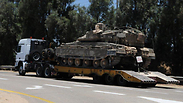
So far the conflict is limited, both in terms of the types of rockets that Hamas fires and in terms of type of the air strikes Israel conducts. A battle of deterrence is always in the background: Hamas wants to put on a show of power in order to achieve some form of long-term deterrence. Israel wants to take this opportunity to impose a more acceptable deterrent level.
Such wars of attrition cannot be sustained for long without an expansion. At present, there is still a chance that the fighting will stop at this stage and Hamas will agree to Egyptian mediation, and will reduce its excessive demands, but Israel rightly preparing for a full confrontation that will apparently more closely resemble Operation Cast Lead of 2008, which means a ground offensive, than Pillar of Defense in 2012.
Both sides had announced they were not interested in an escalation, and probably meant it. So how do we find ourselves in this current situation?
The main reason is that Hamas has in recent days come to the conclusion that it actually wants a broader conflict. More precisely, the military wing wants it. The political leadership is being dragged along in its wake and is not in control of it. The entire organization and the military wing in particular have found themselves in dire political and financial straits; it is isolated in the international arena, has seen its donations dwindle and as a result the de facto Hamas administration in Gaza is barely functioning.
The military wing, in addition to the failure of the kidnap of the three teens in Gush Etzion, suffered a severe setback on Sunday when Israel foiled a strategic attack that Hamas has long been planning. The plan was to enter Israel through a system of terror tunnels that would emanate from the southern Gaza Strip, in the Rafah area, and kill civilians and soldiers with bombs and ambushes by backup forces. This was supposed to be the surprise opening salvo in the next major conflict.
But the plan was discovered and thwarted thanks to the damage inflicted on the tunnels on Saturday night by the Air Force. On Monday, the tunnel opening in Israel was also probably exposed. Hamas and Islamic Jihad militants who went into the tunnel to carry out some damage control or to lay further explosives ahead of the operation were caught when their own explosive devices detonated for reasons that are as yet unclear. Aside from the eight fatalities, this was a heavy blow that defuses the ability to make good on some of the threats that have been made recently.
Hamas' military wing has concluded that it has nothing to lose. Even if it takes a severe beating from the IDF, including a ground incursion, the group could at the end of the fighting, as in the past, negotiate through Egypt new terms that improve its situation, in return for calm.
Controlled escalation
Israel goes into this escalation in a favorable situation. The cabinet has displayed prolonged restraint in the face of the rocket fire; the Shin Bet and police worked speedily and efficiently to solve the murder of the Arab teen Mohammed Abu Khdeir; the both Israel's political establishment and its people rejected and condemned the murder - all these have lent Israel renewed international legitimacy to defend itself.
Furthermore, neutralizing the tunnel attack offers better conditions for the military during an operation in the Strip.
The calm response so far has also allowed Israel to prepare its forces currently deployed in staging areas, and in reality Israel is controlling the escalation. Hamas' only option is to widen the rocket fire, while Israel has far more economic and military options to pressure Hamas.
This will be no picnic. But for now, the two sides still remain in a place in which they could each declare that the other has conceded, and that's probably enough. If not, Israel will amass a much large force, place them a safe distance from Gaza but from which it would be easy to launch an operation with the stated purpose of destroying the heavy missiles and their means of production.
Time is now of the essence. As the fighting escalates so do the chances - heaven forbid - that Israeli or Gazan civilians are hurt. In either case, this could lead to fighting that spirals out of control, leading to unwanted consequences for Israel. Therefore, the IDF's main goals at the moment are to prevent harm to Israeli communities under fire, avoid harming innocent Palestinians, and primarily to end the war quickly thereby reducing the chances of something going wrong.

















